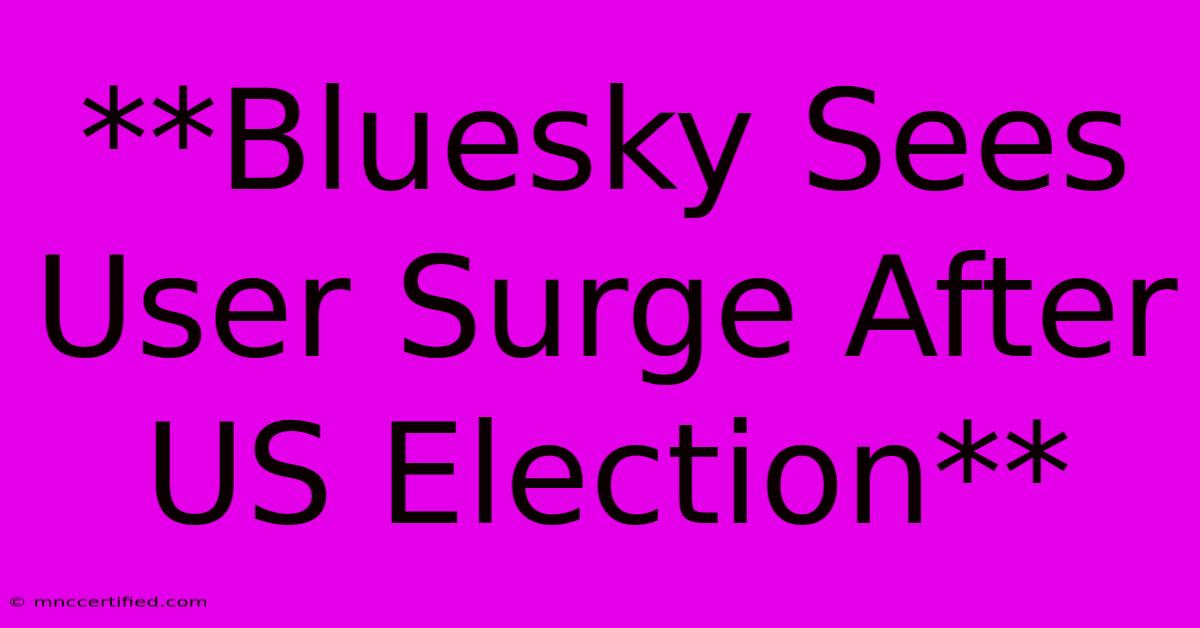**Bluesky Sees User Surge After US Election**

Table of Contents
Bluesky Sees User Surge After US Election: Is Decentralization the Future of Social Media?
The recent US election has sparked a wave of interest in decentralized social media platforms, with Bluesky seeing a significant surge in new users. This surge, fueled by concerns over censorship and platform control, suggests a growing appetite for alternative social media experiences.
Bluesky's Rise: Decentralization and Free Speech
Bluesky, developed by Twitter co-founder Jack Dorsey, promises a decentralized social media experience. It uses the open-source protocol, "AT Protocol," allowing users to own their data and control their interactions. This promise of freedom from centralized control and potential censorship has resonated with many, particularly after the contentious election.
Key Factors Driving Bluesky's Popularity:
- Decentralization: Users are not reliant on a single entity for platform governance, promoting greater transparency and accountability.
- Free Speech: Bluesky emphasizes free speech, allowing users to express themselves without fear of being silenced by platform algorithms.
- Data Ownership: Users control their data, ensuring privacy and preventing its misuse by corporations.
- Algorithm Transparency: Bluesky aims for transparent algorithms, allowing users to understand how content is curated and promoted.
The Election's Impact on Social Media
The 2022 US election highlighted concerns about social media's role in shaping public discourse. The spread of misinformation and the potential for censorship fueled distrust in traditional platforms. This led many to seek out alternative solutions, like Bluesky, that prioritize transparency, free speech, and user control.
Beyond the Election: The Future of Social Media
While Bluesky's surge may be linked to the recent election, it also reflects a broader shift in attitudes towards social media. Users are increasingly seeking platforms that offer:
- Transparency: Understanding how algorithms work and how content is curated.
- Accountability: Holding platforms responsible for their actions and protecting user rights.
- Community Control: Empowering users to shape the platform's direction and values.
The Road Ahead: Challenges and Opportunities
Despite its growing popularity, Bluesky faces challenges:
- Scalability: Handling the influx of new users and maintaining a seamless user experience.
- Content Moderation: Finding a balance between free speech and preventing harmful content.
- User Adoption: Convincing a critical mass of users to switch from established platforms.
However, Bluesky's rise presents opportunities for the social media landscape:
- Innovation: The platform's decentralized approach could drive new features and user experiences.
- Competition: Pushing traditional platforms to be more transparent and accountable.
- User Empowerment: Giving users more control over their online experience and how they interact with information.
Conclusion: A New Era of Social Media?
The post-election surge in Bluesky users signifies a growing demand for decentralized and user-controlled social media platforms. While the platform faces challenges, it also represents a potential shift in how we interact online, prioritizing free speech, data ownership, and community control. It remains to be seen if Bluesky can truly disrupt the social media landscape, but its popularity highlights a desire for a more transparent, accountable, and user-driven online experience.
Keywords: Bluesky, decentralized social media, user surge, US election, censorship, free speech, AT Protocol, data ownership, algorithm transparency, social media future, competition, user empowerment.

Thank you for visiting our website wich cover about **Bluesky Sees User Surge After US Election** . We hope the information provided has been useful to you. Feel free to contact us if you have any questions or need further assistance. See you next time and dont miss to bookmark.
Featured Posts
-
Home Insurance Claim Lawyer Near Me
Nov 13, 2024
-
Appliance Repair Business Insurance
Nov 13, 2024
-
Costco Butter Recall Latest Updates And Information
Nov 13, 2024
-
My Chemical Romance Stadium Tour Stops In Chicago
Nov 13, 2024
-
Villanova Vs Saint Josephs Pa Game Prediction 11 12
Nov 13, 2024